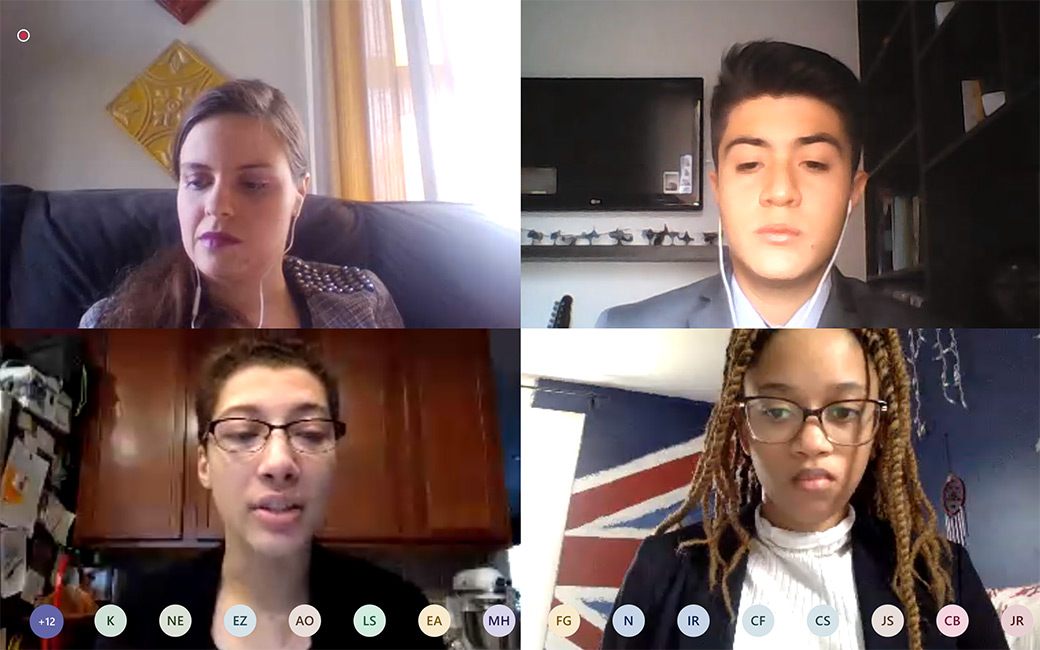Amid pandemic, TU students practice global problem-solving skills
COVID-19 couldn’t stop the annual Model OAS, where TU students debate global issues with peers across the Americas—critical in times like these
By Rebecca Kirkman on April 10, 2020

This week, nine TU students should have been gathered with their peers in the nation’s capital to participate in the Washington Model Organization of American States (WMOAS).
The annual event is a simulation of the Organization of American States (OAS) General Assembly, where delegations of students from universities across North and South America represent the organization’s 35 independent member states.
When gatherings were restricted in response to COVID-19, an in-person simulation was impossible. But because the model OAS allows students to debate real topics covered by the OAS—like carbon emissions, human rights and public health threats—faculty felt that finding a virtual vehicle, especially during the pandemic, would offer students a poignant learning opportunity.
Read more: With Model OAS, TU students get a global worldview
The resulting e-Model, held on Webex Teams from April 6–9, allowed student delegations from 17 universities to interact through a variety of activities designed to replicate the in-person events. Nine Towson University student delegates representing Honduras used one-on-one chats to get signatures for their proposed resolutions and group video conferencing to attend their committee meetings.
“Young people working together to hash out solutions to global problems, and doing so in the current environment of a pandemic, is sorely needed,” says professor Colleen Ebacher, who leads the TU delegation. “While it’s been a lot of work to transition to this new virtual model, it seems even more critical right now.”
In fact, the resolutions passed by students in the simulation could make an impact in the real world. Each year, the OAS reviews the resolutions passed during the Washington Model OAS.
“They are extremely interested in the ideas and solutions that students come up with,” Ebacher says, noting that innovative ideas could make their way into the real organization’s General Assembly. “It has a real impact; it’s not just an exercise.”
On April 9 OAS Secretary-General H.E. Luis Almagro tweeted the student delegates: “I wish you great success and commend you for your effort & dedication to virtually meet & carry out the work in these times of #COVID19.”
on
After months of preparation for the in-person model through the course LAST 385, TU students embraced the change as a learning opportunity.
“Coming into this experience, I was excited to be surrounded by people who share the same interests as me,” says Alejandra Ayala, a junior majoring in international studies and minoring in political science.
Ayala’s resolution aimed to promote education and civil services around women’s reproductive rights. “My class and I had to adjust very quickly to the e-model, but I tried to go in with a positive mindset and make the best of the situation.”
“You acquire so many skills through the process of preparing—public speaking skills, debating skills, writing skills, social interaction, politicking and negotiating,” says Vanessa Clark ’20, an international studies major who served as a social media rapporteur for the spring 2020 e-Model.
“It’s a unique experience getting to hear from people in different regions and getting to interact with them and discuss and debate real issues, which are especially relevant now,” Clark adds. “And not just getting to discuss those issues but, more importantly, come up with solutions for them.”
This story is one of several related to President Kim Schatzel’s priorities for Towson University: TU Matters to Maryland.